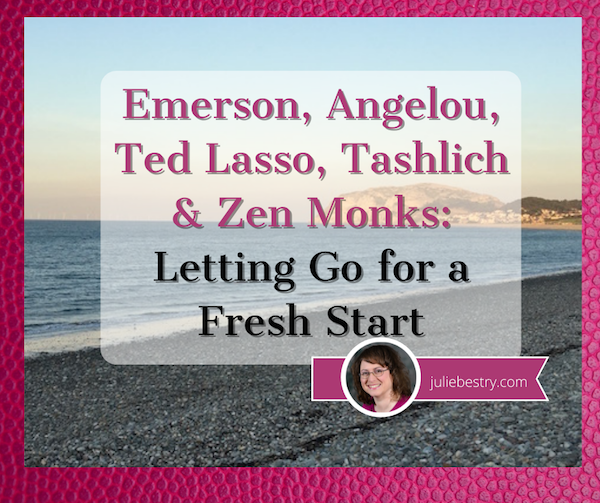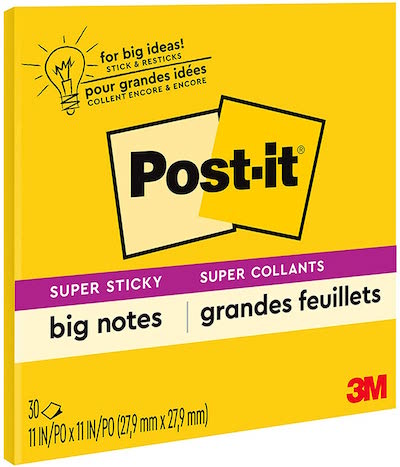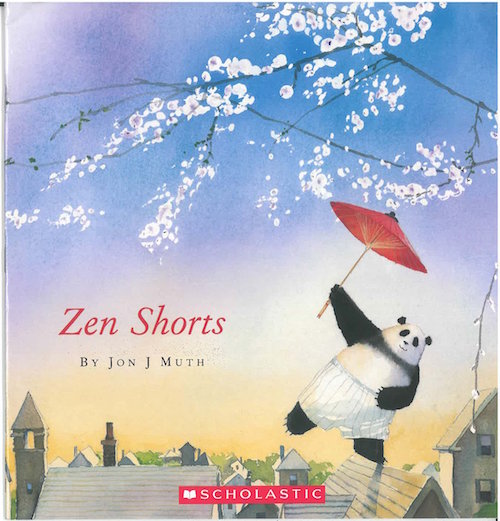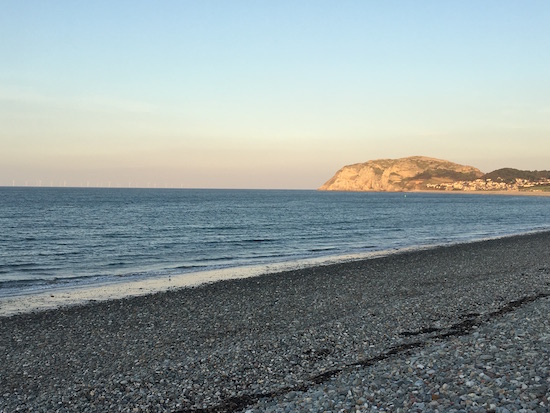Emerson, Angelou, Ted Lasso, Tashlich & Zen Monks: Letting Go for a Fresh Start

THERE’S SOMETHING IN THE AIR
Officially, the summer doesn’t end until September 21st. But you just know that something is changing right now. For all intents and purposes, in the United States, Labor Day is the unofficial start of Fall (and pumpkin spice doughnut season at Krispy Kreme).

Growing up in New York State, we always started school the Wednesday after Labor Day, so you knew that the holiday weekend was the last time you got to stay up late, sleep in, goof around, and wear comfy summer clothes. Companies around the country that had lax Friday afternoon schedules went back to firm attendance expectations once the calendar flipped to September.
This year, sundown on Labor Day coincides with Erev Rosh Hashanah, the start of the Jewish New Year. (For those of you keeping track of such things, we’re ending the year 5781 and ushering in 5782.) And I think we can all agree that any opportunity to start fresh with a new year, whether it’s January 1st or a new school year, Rosh Hashanah or Chinese New Year, or the start of the new TV season (Monday, September 20th, the day after the Emmy Awards, baby!), is a good thing, psychologically.
Because of remote work, remote school, and nothing feeling remotely normal last year, it didn’t feel like we had a clean demarcation between summer and fall. This year, it’s shaping up, globally, to be another weird one.
But locally? As in — your job, your family, your little world? You can still have some control. You can embrace this period as the end of those fuzzy, mirage-like summer dreams and the start of a period of motivation, enthusiasm, and a bias toward action.
Speaking of which, before we get to the focus of today’s post, watch this TEDx talk about The Science of Taking Action to help rev your engines.
I encourage you to take the 9:47 to watch the whole video, but if you don’t have the time right now, know that Steve Garguilo‘s central lesson is, “Everything in life that is hard is just a series of things that are easy.” But you have to take that next step.
[FYI, Garguilo’s spontaneous foray in looking at a bias toward action began with some free Post-It Super Sticky Big Notes and a friend. They’re 11″ x 11″ squares, $6.49 for a 30-sheet pad in Bright Yellow, and great for brainstorming. (Friend sold separately.)

Though harder to find, Big Notes also come in Neon Green and Neon Orange, and in 15″ x 15″.]
But as usual, I’m getting ahead of myself. While you can always brainstorm, actually taking action requires a prior step.
To be productive and embrace new things, you have to let go of the old and unproductive ways of thinking and acting. In professional organizing, when my clients are dealing with tangible clutter, we have to do what I call a “Level 1 Purge” and remove as much excess as possible before grouping and containing what remains.
With time management coaching, this involves eliminating tasks and obligations that don’t resonate with someone’s values and goals so that they can say, “Hell Yes!” to the things that will bring more meaning to their lives and work.
And with everything, a huge part of letting go means decluttering mental and emotional clutter.
LET IT GO!
That tune from Disney’s Frozen isn’t just catchy. It’s good advice. (Well, at least the “I’m never going back, the past is in the past” and the part about letting go of perfectionism.)
It’s really difficult to start fresh with the weight of the past hanging over you. As I’m writing this over Labor Day weekend, I (and I expect, you), probably don’t want to be weighed down with heavy thinking and step-by-step instructions. Instead, we’ll look at approaches from different cultures and for different audiences — sectarian and non-sectarian, children and adults, highbrow and middlebrow.
Zen Meditations from a Panda Perspective
Many years ago, friend-of-the-blog Erin Doland introduced me to the 2006 Caldecott Medal–winner Zen Shorts by Jon J. Muth. In Muth’s books, three siblings meet Stillwater, an oversized panda bear carrying a red umbrella and speaking with a “slight panda accent.” In each chapter, Stillwater shares an anecdote with brothers Karl and Michael and their sister Addy to help them surpass an emotional obstacle. (The books have since been turned into an a delightfully soothing animated series, Stillwater, on AppleTV+.)

Muth’s telling of A Heavy Load is a version of my favorite Zen story. (I’ll summarize it here, but it’s absolutely worth getting the book, reading Muth’s words, and embracing the lovely illustrations.)
Two monks are traveling when they come to a swollen river that must be crossed. A wealthy woman’s servants attend to her belongings and thus cannot help her cross to the other side. Without comment, the older monk lifts the woman and carries her across, but after he puts her down, she doesn’t even deign to thank him. The two monks continue on their way, but his younger companion still ruminates on the woman’s rudeness and lack of appreciation. Eventually, the older monk says, “I set the woman down hours ago. Why are you still carrying her?”
Whoa.
When I was younger, I would do this. I’d ruminate and brood over indignities suffered at the hands of the “mean girls.” I’d kick myself over l’esprit d’escalier, the French term for thinking of the perfect reply, but just too late. And sometimes I’d be frozen in place by small errors, anything from typos to falling short on goals, even when nobody cared about those benchmarks but me.
It’s hard to let go, but sometimes rituals (actions) and mantras (sayings) can help us over the hump in letting go of counterproductive ruminations on our own shortcomings so that we can start fresh on a new project or class, or in a new season of life or a new “year” (however we define the year).
Tashlich
Tashlich literally translates to “casting off.” It’s a ceremony held in the afternoon on the first day of Rosh Hashanah. Jews who observe this ritual head the shores of a river or lake or a bridge over flowing waters, and throw in small pieces of bread* to symbolically cast off or throw away one’s “sins” or failings, the things they’ve done wrong in the past year.
*Bread isn’t good for the duckies and other wildlife, it seems, so there are a number of modern takes on tashlich that are more environmentally-friendly.

Tashlich is a physical ritual to representationally cast off what’s weighing you down. It’s not a magic hall pass. We’re still expected to apologize to those we’ve hurt in the past year and make amends to them between Rosh Hashanah and Yom Kippur, the next week. But Tashlich gives everyone who participates the opportunity to reject dwelling on our mistakes. We’re encouraged forgive ourselves and focusing on what we can do better.
Of course, you don’t have to be Jewish to develop your own ritual. Many faiths and cultures have “burning bowl” or similar rituals for writing your mistakes, your upsets, or as “Money Goddess” Morgana Rae teaches, “lessons you are done learning” (e.g., letting people stomp on your boundaries) on small pieces of paper and then burning them.
Paper Mommy doesn’t let me play with matches, so you could similarly write on a small piece of biodegradable paper and flush those troubles away. You can even teach children to let go of last school year’s mistakes or troubles by using sidewalk chalk to write or draw them out and then bring the river to them with a garden hose to wash everything away.
The point? Acting out such a ritual is more than just cognitive. It involves your whole body in saying, “I’m letting go of what I did wrong, what I let others do, and whatever stood as an obstacle to my moving forward.” Sometimes, our brains aren’t so smart until we get our bodies involved.
A (Famous Literary) Parent’s Advice to His Child
Starting fresh depends on being able to absorb the lessons of our mistakes while doing better the next time.
In 1854, Ralph Waldo Emerson wrote a letter to his daughter Ellen, who was away at school. In the 1880s, his letters were carefully preserved in a six-volume collection, and in 1939 (and again in 1943, 1959, and 1982), his advice was re-edited and re-punctuated. But the central notion of what he wanted his daughter to understand is this:
Finish every day and be done with it.
You have done what you could;
some blunders and absurdities crept in;
forget them as soon as you can.
Tomorrow is a new day.
You shall begin it serenely and with too high a spirit to be encumbered with your old nonsense.
It’s hard to argue with good old Ralph Waldo. Post this (or any of the various edited versions of his advice) near your desk, so you’ll see it before you close up shop on your work day, or on your mirror so you’ll see it before going to bed at night.
Give yourself permission not to be encumbered with your old nonsense!
Be a Goldfish!
Of course, not everyone wants or needs such a long message as Emerson’s to inspire letting go of self-imposed difficulties. If you need a short mantra to remind yourself to let go, Coach Ted Lasso has some advice that resonates.
Be a goldfish. Have a short memory for the times when you failed and things you can’t go back and change.
OK, in actuality, scientists have proven that goldfish can actually recall things for at least three-to-five months.
But the lesson holds true. Acknowledge what didn’t work, vow to do better, identify what specific steps you can accomplish to achieve your goals, create new systems (of which, more next week), and start fresh.
Oh, and an excellent way to let go is to embrace something that captivates and delights you. For me, an episode of Ted Lasso makes me grin until my face aches, fills me with unexpected laughter, and inspires me with lessons about forgiveness (and self-forgiveness). It’s a great show for reinforcing the idea of being supportive (and accepting support) so you can learn essential lessons and move forward.
Maya Angelous Wasn’t Speaking Only to Oprah
The amazing Dr. Maya Angelou is often misquoted or incompletely quoted on this topic of recognizing our past failings but moving beyond them. She actually focused on her own experience:
I did then what I knew how to do.
Now that I know better, I do better.
Of course, Oprah (being Oprah) managed to turn Dr. Angelou’s lesson around, turning it outward as actionable advice.
“When you know better, you do better.”
As you head into this “new year,” and start getting back into routines and begin making your ideas biased toward action, take the lessons you learned but leave behind the pain and the guilt.
And, as a bonus, directly from Dr. Angelou, here’s another great mantra to take with you after you’ve let go of what weighs you down:
Just do right.
Next time, we’ll look at more practical ways to get back into the swing of things. Until then,
Happy New Year!
L’shana tovah!
Have a great school year!
Enjoy fall!
And I’ll see you at Krispy Kreme!




“…some blunders and absurdities crept in…” – that feels like life right now for me (and probably many others). There’s so much wisdom here it’s hard to know where to start. Fall has always felt like a mini-New Year for me, perhaps because I adored the start of school and the cooler temperatures. It’s an optimal season to let things go (both the physical and philosophical), so perhaps it’s time for me to let go of my resistance to Ted Lasso and start watching. 🙂
Do it! I just finished all the available episodes of Ted Lasso (totally at Julie’s encouragement) and wish I didn’t have to wait for more.
I always thought it was a poem, oddly freeform, until I researched it for this post, and it was just part of a letter to his daughter, later reformatted by biographers and editors.
And thank you for your kind words. I hope this new year brings you a lovely fresh start.
I assure you, if you think it’s about a goofball American or about sports, it’s really not. It’s about being good and kind, and it’s delightful!
I can’t believe you mentioned Krispy Kreme without adding that everyone with a COVID vaccination card can get ONE free donut EVERY DAY (if they want to) between whenever the offer was made (months ago) and the end of 2021. (I’ve been twice.)
I love that you offered several ways to start over fresh, ranging from Taschlich to “Be a Goldfish”. (I’m not Jewish, and didn’t know the term Taschlich, so I misread it AND mistook it for a surname, like Angelou, and thought you were going to include a quote from Jeff Tiedrich that somehow applied, lol.)
In Santa Fe there is a tradition (same idea, same time of year) called Zozobra, where they build a giant (50 ft) marionette effigy and burn him, along with slips of paper where people write their “glooms” and whatever else they’ve brought along that they would like to forget, like (according to Wikipedia) legal papers, divorce documents, mortgage pay-offs, parking tickets, and even a wedding dress. I’ve never been because it sounds too creepy for me, but others say it’s a fun event.
LOL, I thought I’d mentioned it in the vaccination card post, but apparently not. Last week, they even gave everyone two! And I did try to find a way to refer to Tashlich as a person or group of people in the title, but there’s not a particular group that does it. Hopefully, it’ll just encourage people to check out the post.
Zozobra sounds very interesting! Maybe next year, I’ll have a whole collection of rituals and activities like this!
Thank you for all this wisdom! An interesting but wonderful deviation from your recent series on notebooks.
Well, after 9 weeks of notebooks this summer, the last month has been its own kit and kaboodle fresh start! May you also have a fresh start on whatever you like!
What an inspired way to ring in this “other” New Year! I agree that last summer to fall felt strange, and this year does too. School started in New York BEFORE Labor Day. That never happens.
Then there are the Jewish holidays- right here, right now. How did they arrive so soon already? I’m looking forward to the reset they give and throwing the twigs into the river for Tashlich. It’s a simple but powerful tradition of coming together, singing, apologizing, and letting go of transgressions.
Being from the northeast with four distinct seasons, the change in the landscape has always inspired me to reset. And now, thanks to you, instead of the visible changes that are happening outside, I have some additional places to go for inspiration. Happy, healthy, and a sweet New Year to you, Julie!
Thank you for your insight, Linda, and may you also have a happy, healthy, and sweet New Year! L’shana Tovah!
Oh Julie, You’ve done it again! This is a wonderful reminder of all the many traditions, movies, writers, and philosophers who advise us how and why to let go. I love the ritual of throwing away the mistakes of the past year.
I wish you a very Happy New Year and pray that this year is better than the year before.
Thank you for your kind words, Diane, and for reading. Onward to 5782!
I think you wrote this one for me, my friend. “Why are you still carrying her?” Whoa is right. Whoa.
My lovely friend, I assure you, it’s there for all of us.
I love the lesson of letting go of your mistakes “washing them away” and then moving on. I try to wake up every day with a clean slate and start fresh. The story of the monks is very powerful. I’m saving that.
What a great approach. I try this with the new month and the new week, but yes, starting fresh with each day is a beautiful way of living!